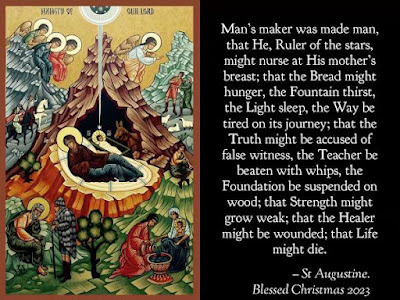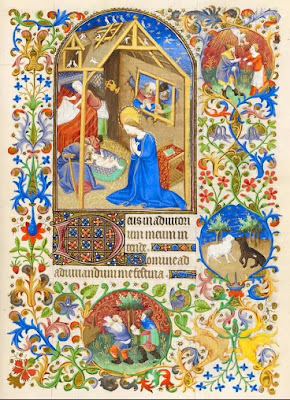What do the readings tell us about the Holy Family? In the 1st Reading, Abram and Sarah were given the promise of an abundance of descendants despite the sheer reality of the impossibility that accompanies declining years. Yet God’s promise was fulfilled when an old man and a barren woman was gifted with a son Isaac. The 2nd Reading simply repeated the saga of Abram and Sarah in the context of faith in the Lord. This leads us to the Gospel. Both Mary and Joseph, according to the customary practice, brought Jesus to the Temple, fulfilling the instructions found in the Book of Exodus that every 1st born male child be consecrated to the Lord. Meeting both Simeon and Anna in the Temple who both predicted the future of the Child, both Joseph and Mary kept faith in the Lord.
Faith in God and His promise fulfilled seem to run through the readings. Even though the focus is on faith, the spotlight is not on God because faith already presumes that there is a divine being. The attention is rather on the subjects, that is, on those who have faith. In the context of this Sunday’s celebration, the Holy Family, the focus may not really be on the faith per se but on the family itself.
What is it to be called the Holy Family? We should perhaps begin with our understanding of an ideal of what it means to be a model family. The notion of an ideal or a model suggests of nobility or excellence. In other words, what should the best expression of a family that has faith in God be like?
In a way, our perception of the Holy Family is derived from present experiences of celebrities and personalities. It feels like the way we appreciate holiness is to begin with the all too familiar experience of dysfunctionality. We have Joseph, the silent type who did not want anything to do with a younger woman pregnant with a child not from him. Mary conceived a child out of wedlock. Jesus lived with His parents until He was 30 and then became an itinerant preacher. Somehow there is comfort when the Holy Family looks less holy and more like us.
Such a description reveals that our definition does not begin with a call but rather a mirroring. Perhaps it explains our mediocrity more than anything else. Holy is considered too holy or out of reach for most of us. Sadly, one of the excuses we hear all too frequently is that the models of personal holiness encountered in Church are hypocritical and Pharisaical. If not, the holiness of saints, judging by the iconography is rather insipid or lifeless. Imagine statues and images of St Joseph holding lilies, never mind that the flowers symbolise his purity and abstinence. In defining the Holy Family through our experiences, in trying to make them identify with us, we may have settled on mediocrity in the matter of holiness.
While it may be true that the circumstances surrounding the Holy Family resemble many typical families, the truth is, unwittingly we may have replaced beauty with ugliness. Thus, the Holy Family is not an ideal to strive for, as we are more comfortable defining them according to our moral state of being. Since we are unable to ascent the steep incline to holiness, we are more likely to shape holiness according to our poor standards. Across the board we can recognise this turning in on ourselves. In fact, we desire a Church that reflects our sensibilities rather than a Church, like a good mother, challenging us to a higher moral standard.
The Holy Family is like us but we are not the standard. They still remain the measure for our families. The circumstances affecting Joseph, Mary and Jesus have shown us that the climb to holiness is hard work. Joseph despite his reservation took on the mantle of fatherhood for Jesus born of Mary. In all the travails from the Annunciation to the Resurrection, Mary is measured by one thing. She pondered everything in her heart. She must have had many experiences but never once did she step away from the will of God. This is why the Holy Family is holy.
In being the Holy Family, the greatest challenge that Joseph, Mary and Jesus posed to us is how we want to define a family. What is a family? In as much as we attempt to make dysfunctionality the model for the Holy Family, we will find ourselves struggling to define what marriage is and what it is supposed to consist of. We also find ourselves agonising over what a family is. The Catechism is quite clear on this matter that “a man and a woman united in marriage, together with their children, form a family”. (CCC2202). This definition is increasingly challenged by what is seemingly a progressive society that measures “improvement” from the perspective of accommodating any permutations possible in the way we arrange human relationships. Anyone who dares question the morality of possibility will be judged as uncompassionate. The present moral code stands as anything which is possible should be permitted and it does feel like that some parts of the Church are already giving in to the secular[1] definition of marriage and family.
The idea that celebrates Mary as an unwed mother is not correct because she conceived at a time when she was already betrothed to Joseph which meant that he too played a role in the Incarnation of the Son of God. In the context of marriage, God chose a proper family for His Son to be born into. Christ was born into a family where motherhood and fatherhood are part of His human experience.
The Holy Family is not holy simply because of who they are. Jesus is the Son of God, sure. He is by nature, holy. Mary is conceived without Original Sin, sure. She is holy by grace. Joseph is a good father, sure. He is a holy and honourable man. No, they are holy not because of who they are. They became holy because in their lives, they strained and strove to do the will of God the Father. Rightly so, the Church proposes the Holy Family as the ideal for our contemplation because they may resemble us but there is more to their resemblance. By their faith they point us in the direction of God to whom their holiness is modelled on.
[1] I dare not even use the word “unholy”. That is how fearful one must be of the thought-police.








